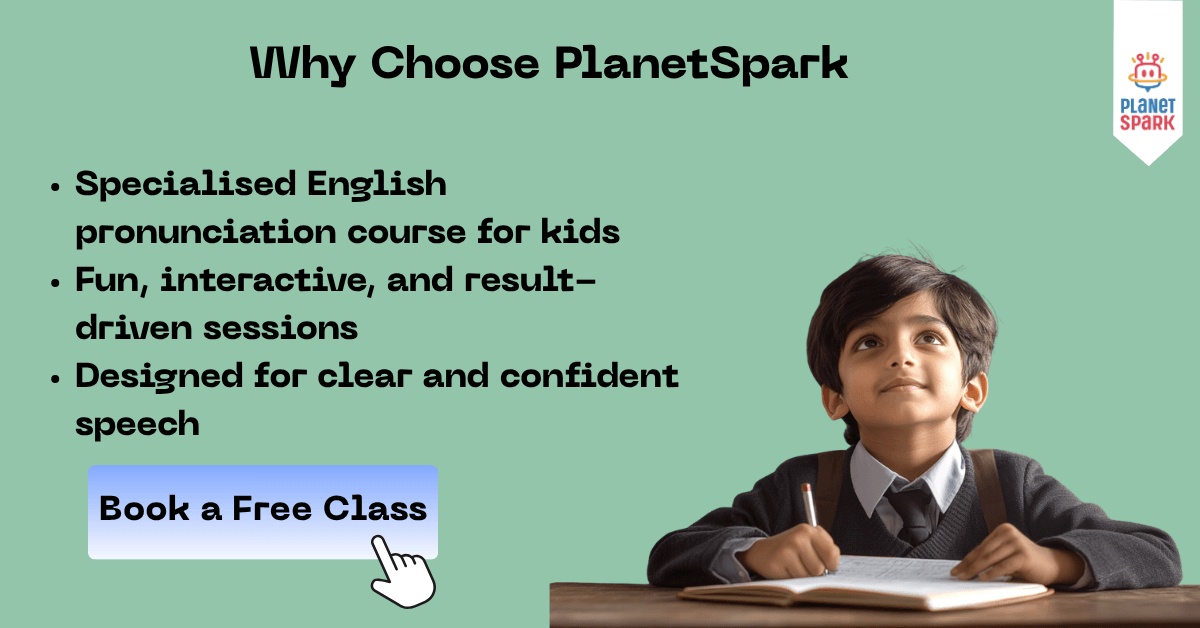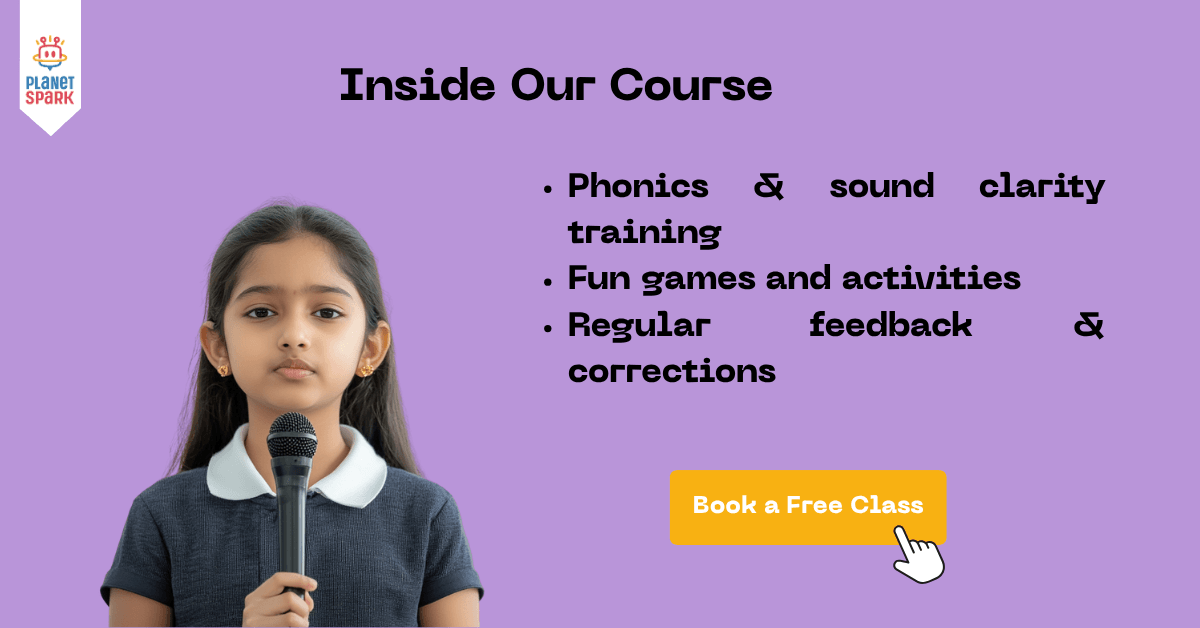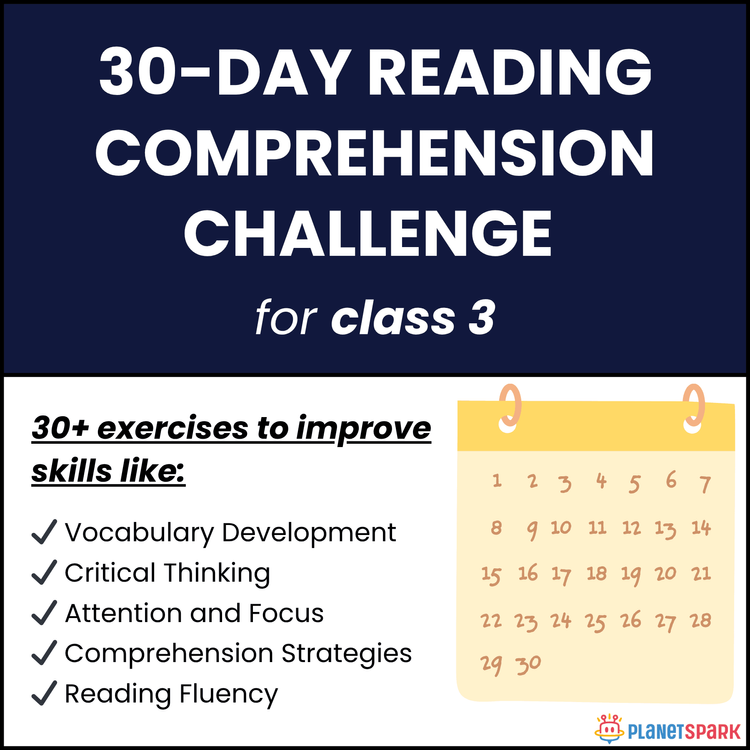English Pronunciation Course for 5th Grade Students
Last Updated At: 8 Aug 2025
10 min read

Table of Contents
- Understanding English Pronunciation
- 2. Why 5th Grade is the Right Time
- The Science Behind Pronunciation Learning in Kids
- How Pronunciation Impacts Overall Communication Skills
- Key Components of a Good English Pronunciation Course
- Teaching Methods & Tools That Work
- Common Mistakes in Pronunciation & How to Fix Them
- Benefits of a Pronunciation Course for Kids
- Real-Life Applications of Good Pronunciation for 5th Graders
- Parent’s Role in Pronunciation Practice
- Fun Activities to Reinforce Pronunciation at Home
- Advanced Pronunciation Strategies for Older Kids
- PlanetSpark’s English Pronunciation Course for Kids
- Myths About Pronunciation Learning
- FAQs
Speaking clearly is key to confidence and success in school. For 5th graders, the right English pronunciation course builds strong speaking skills, boosts academic performance, and prepares them for public speaking and global communication. In this guide, we’ll explore why pronunciation matters, what a good course should include, and how PlanetSpark helps children speak English with clarity and confidence.
Perfect Your Child’s Speech Skills
Understanding English Pronunciation
What is Pronunciation?
Pronunciation refers to how words are spoken so they are understood correctly by others. It includes:
Phonemes: The smallest sound units in a language (/p/ in “pen” vs. /b/ in “ben”).
Stress: Which syllables or words we emphasize in a sentence.
Intonation: The rise and fall in voice to convey meaning and mood.
Rhythm: The pattern of stressed and unstressed syllables in speech.
For example, the word record changes meaning depending on stress:
REcord (noun): a document or achievement
reCORD (verb): to capture sound or video

Why 5th Graders Face Pronunciation Challenges
At this stage, children often face issues like:
Mismatch between spelling and sound (e.g., “colonel” /ˈkɜrnəl/)
Mother tongue influence, adding sounds or changing them to match native language patterns
Lack of exposure to diverse English accents and natural speech
Limited awareness of stress, rhythm, and linking
Without correction, these patterns can stick for years, affecting confidence and clarity.
2. Why 5th Grade is the Right Time
Cognitive Readiness
At 10–11 years old, children can process abstract language rules, spot pronunciation differences, and mimic them effectively.
Academic Demands
In 5th grade, vocabulary expands rapidly, with more complex words in subjects like science and literature. Correct pronunciation helps children:
Answer confidently in oral exams
Participate actively in group discussions
Read aloud smoothly in class
Habit Formation
Speech habits formed at this age become the default pattern into teenage years and adulthood. Correcting errors early prevents the reinforcement of incorrect speech.
The Science Behind Pronunciation Learning in Kids
Speech development research shows that:
Neuroplasticity is still strong in late childhood, making it easier to adopt new speech patterns.
Children learn best with multisensory methods, combining listening, seeing, and speaking.
Repetition and contextual practice strengthen memory and recall of correct sounds.
Example:
A child learning the /th/ sound in “think” benefits more from hearing it in stories, repeating it in tongue twisters, and using it in real conversations than from drilling it in isolation.
Make Every Word Clear and Confident
How Pronunciation Impacts Overall Communication Skills
Pronunciation is not just about saying words correctly, it’s at the heart of how well a child communicates ideas, emotions, and knowledge. For 5th graders, who are increasingly involved in presentations, debates, and peer discussions, good pronunciation becomes a foundation for success.
1. Clarity of Message
When a child pronounces words correctly, the listener immediately understands the intended meaning. Mispronunciations can lead to misunderstandings or the need to repeat sentences, which can frustrate both the speaker and listener. For example, mixing up “ship” and “sheep” can completely change the meaning of a sentence.
2. Confidence in Speaking
Children who know they speak clearly are more willing to participate in class, ask questions, and volunteer for public speaking opportunities. This creates a positive feedback loop, the more they speak, the more skilled they become.
3. Listening and Comprehension Skills
Pronunciation training isn’t just about speaking, it improves listening too. When kids learn how sounds are formed and stressed, they also start to pick them out more easily in other people’s speech. This makes it easier to follow lessons, group conversations, and instructions.
4. Social Interaction and Peer Acceptance
At the 5th grade level, peer impressions matter. A child who can articulate clearly is often perceived as more confident and knowledgeable. This can lead to better teamwork experiences and leadership opportunities in group projects.
5. Academic and Career Foundation
Though careers may seem far off, the skills developed in pronunciation practice will be invaluable in the future, whether for interviews, presentations, or networking. Many successful leaders, from politicians to business executives, credit clear speech as a cornerstone of their success.
Example Scenario:
Imagine two students delivering a short presentation on a science topic. Both know their material equally well, but one speaks with clear pronunciation, natural rhythm, and appropriate intonation, while the other mumbles and mispronounces key terms. The first student’s message is received enthusiastically, while the second’s ideas may be overlooked despite their quality. This illustrates how pronunciation can make the difference between being heard and being truly understood.

Key Components of a Good English Pronunciation Course
a) Phonemic Awareness
Introducing children to the sounds of English and how they are produced.
Activity: Match sounds to mouth shapes using mirrors.
b) Stress Patterns & Rhythm
Teach stress rules: content words are stressed, function words are not.
Practice rhythmic reading with clapping for stressed syllables.
c) Intonation
Help children express meaning with voice changes, e.g., rising tone for yes/no questions, falling tone for statements.
d) Word Linking
Make speech sound natural by connecting words (e.g., “next day” → /neksteɪ/).
e) Mouth Exercises
Lip stretches, jaw relaxation
Tongue twisters for agility: “Red lorry, yellow lorry”
f) Listening Skills
Daily exposure to clear English audio to train the ear.
g) Practical Speaking
Role-plays, presentations, and group storytelling.
Turn Speaking Struggles into Strengths
Teaching Methods & Tools That Work
Live Classes with trained educators for real-time correction
Speech Recognition Apps that give instant feedback
Phonetic Charts & Flashcards for tricky sounds
Games & Competitions to keep interest high
Storytelling & Drama for natural use of pronunciation
Group Practice to build confidence
Common Mistakes in Pronunciation & How to Fix Them
| Mistake | Cause | Fix |
|---|---|---|
| Wery → Very | /v/ and /w/ confusion | Practice lip-teeth placement for /v/ |
| Eschool → School | Adding vowels before consonants | Drill consonant cluster starts |
| Com-fort-a-ble → Comfortable | Reading as spelled | Teach syllable reduction |
| Kash → Cash | /ʃ/ and /s/ confusion | Minimal pair listening drills |
Benefits of a Pronunciation Course for Kids
Academic success: Clear oral answers, confident reading
Confidence: Speaking without fear of ridicule
Better listening: Understanding teachers and peers easily
Global readiness: Adaptability in diverse settings
Help Your Child Speak Clearly and Confidently
Real-Life Applications of Good Pronunciation for 5th Graders
Learning pronunciation is not a theoretical skill, its value is seen daily in the life of a 5th grader.
1. Classroom Participation
When teachers ask questions, students with good pronunciation answer with confidence. Their responses are clear, making it easier for teachers to assess understanding without needing to clarify or repeat.
2. Reading Aloud
Whether it’s a poem, a story, or a textbook passage, proper pronunciation makes reading aloud engaging and impactful. This not only impresses teachers but also keeps classmates interested.
3. Group Projects & Discussions
In group activities, communication is key. Clear pronunciation ensures that ideas are heard, understood, and respected. It also reduces conflict caused by misheard instructions or suggestions.
4. Storytelling & Drama Activities
Many schools include storytelling competitions or drama skits. Pronunciation training helps children convey characters’ emotions and deliver lines with natural flow, making performances more captivating.
5. Sports & Extracurriculars
Even in non-academic settings like sports, correct pronunciation matters, calling out instructions, motivating teammates, or explaining a game plan needs clarity to avoid confusion.
6. Digital Communication
In today’s world, students often record video projects or participate in online discussions. Clear pronunciation ensures that digital audiences, which may include people from other regions or countries, understand their message without difficulty.
Case Study:
Ananya, a 5th grader, joined her school’s storytelling competition after three months of PlanetSpark’s pronunciation course. Her improved intonation and rhythm not only made her story exciting to listen to but also helped her win first prize. The skills she learned carried over into her science presentations and group debates.
Parent’s Role in Pronunciation Practice
Parents can:
Read aloud with their child daily
Play English rhyming games and tongue twisters
Use English media (songs, stories, shows)
Give gentle, positive corrections

Fun Activities to Reinforce Pronunciation at Home
Sound Bingo: Match heard sounds to word cards
Mirror Speaking: Practice mouth shapes
Speed Reading: Read passages with correct stress faster each time
Accent Imitation: Copy native speakers from videos
Advanced Pronunciation Strategies for Older Kids
Once children master the basics of pronunciation, they can begin refining their skills to achieve near-native clarity and fluency.
1. Shadowing Technique
This involves listening to a native speaker’s audio and speaking along at the same time, imitating their pronunciation, rhythm, and intonation. It trains both listening and speaking skills simultaneously.
Activity: Play a 30-second audio clip of a newsreader or storyteller. Have your child repeat it word-for-word in sync.
2. Phonetic Transcription Practice
Introduce children to the International Phonetic Alphabet (IPA) for tricky words. Knowing how a word is transcribed helps them pronounce it accurately, even without hearing it first.
3. Stress Shift Awareness
Some English words change their stress patterns when used as different parts of speech (e.g., record). Advanced learners can practice spotting and applying these shifts in reading and speaking.
4. Connected Speech Mastery
Older kids can work on blending words smoothly to sound more natural. This includes practicing linking, elision (dropping certain sounds), and assimilation (changing sounds to fit their surroundings).
5. Accent Exposure
Listening to different English accents, American, British, Australian, helps children adapt to varied speech patterns, improving their listening skills and preparing them for global interactions.
Pro Tip:
Encourage your child to watch short interviews or speeches in different accents and note differences in vowel sounds, stress, and rhythm.
6. Self-Recording & Analysis
Using a phone or computer, children can record themselves reading a passage, then compare it with a native speaker’s version. This helps identify and correct subtle mistakes.
Help Your Child Speak with Clarity
PlanetSpark’s English Pronunciation Course for Kids
PlanetSpark offers an English pronunciation course tailored for 5th graders that blends learning with fun.
Why It Works
Certified Trainers: Experts in child speech improvement
Gamified Learning: Quizzes, challenges, badges
Personalized Plans: Focus on each child’s problem areas
Tech Integration: Speech recognition for instant feedback
Myths About Pronunciation Learning
Myth: Only young kids can improve pronunciation.
Truth: Improvement is possible at any age, but earlier is easier.Myth: You must lose your accent.
Truth: The goal is clarity, not accent removal.Myth: Reading more is enough.
Truth: Reading helps vocabulary, but speaking practice corrects pronunciation.
Pronunciation is more than sound accuracy, it’s confidence, clarity, and connection. For 5th graders, this is the best stage to develop lifelong speaking skills. With the right English pronunciation course, like PlanetSpark’s, your child can speak fluently, clearly, and with pride.
FAQs
Q1: How long to see results?
A: Most kids improve noticeably within 8–12 weeks.
Q2: Are online classes effective?
A: Yes, with interactive tools and live feedback, they can be highly effective.
Q3: Will this help in public speaking?
A: Absolutely. Clear speech is essential for presentations and debates.
Q4: Is phonics knowledge necessary?
A: Helpful but not mandatory, the course covers sound basics too.
Download Free Worksheets
Personalized Communication Report
Record a video to get a AI generated personalized communication report for your child
Select Learner's Class

Hi There, want to try these
tips for your child with
LIVE with our expert coach?
Let's check your child's
English fluency

